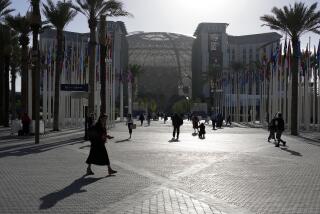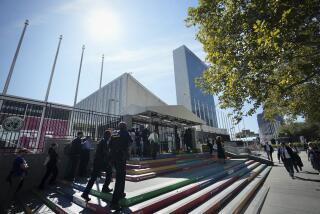PERSPECTIVE ON AFRICA : Stepping Back From Irrelevance : The continent must halt its slide toward isolation. The integration of Europe is an object lesson.
- Share via
LAGOS — The 1980s have been rightly described as a lost decade for Africa. Whatever economic or social indicators one may choose, virtually all African countries have regressed from where they were at the end of the 1970s and the early 1980s.
The African continent as a whole, particularly sub-Saharan Africa, deteriorated in all essential areas of development. Africa cannot grow enough food to feed its people. Thirteen million in the formal wage sector are unemployed; another 95 million are underemployed. Per capita consumption is declining rapidly.
These numbers alone, however, do not adequately indicate the magnitude of the marginalization Africa has experienced in world affairs, especially in political and strategic terms.
Africa today is not only in an economic crisis dramatized by widespread famine, malnutrition and abject poverty, compounded by uncontrolled population growth, it is also burdened by serious and frequent violations of human rights from one-party and one-man dictatorships. Ineffective governance, lack of accountability, disregard for the rule of law and denial of rights to minorities have led to internal and regional conflicts and thus excessive military expenditures.
If these trends continue during the 1990s, Africa’s marginalization will become complete isolation.
But, as old political systems break down and a new democratic ideal is enthroned, as economic and civil cooperation is being encouraged, Africa now has a new opportunity for addressing its problems.
This is essentially the responsibility of Africans, because they largely brought about their own marginalization. Yet, while Africans must be the main architects of their fortune or misfortune, it must be appreciated that they also got into their dismal situation because of the actions and reactions of the international community--particularly the major military, political and economic forces in the world.
With capital increasingly being directed to such causes as reconstruction of the Persian Gulf and transformation of Eastern Europe, the outlook for Africa is not encouraging.
Africa must redouble its efforts to achieve political and economic improvements. This must include strategies to cope with all-too-familiar economic emergencies; overcome balance-of-payments crises and debilitating debt; improve governance by launching political liberalization, and reconcile the complex task of development with the new demands for environmental sustainability.
How can these daunting tasks be accomplished?
A few months ago, a group of African leaders suggested that a conference patterned along the lines of the European experience with the Helsinki accords might be a useful model in devising a mechanism for the African circumstance. Such a conference may be a viable option. But it must include both African and non-African members.
The problems confronting Africa are multidimensional, and solutions to them must be multifaceted and coordinated. Security issues have political and economic implications. Economic problems aggravate poverty and invariably heighten social inequities and injustices. Victims of deprivation and oppression seek redress through sometimes-violent demonstrations that disturb general security. Problems feed on problems.
The concept of the African conference establishes an explicit link between the four main issues--security, stability, development and cooperation.
In Africa, security should go beyond the traditional military definition. It must be more broadly defined to reflect the aspects of physical and economic security for each individual, including access to such basic necessities of life as food, shelter, education and health. Security is the foundation of survival and a condition for progress in every society.
Although there are no military blocs in Africa, a disarmament and common defense process must also be initiated for the continent because of the prevalence of conflicts. African states should set up effective security arrangements that provide for conflict resolution and peace-keeping.
Inspired by the model of the European Community, and in response to a global system characterized by regional economic blocs, African governments must also vigorously pursue economic cooperation and development. To that end, existing subregional organizations must be more effective. Cooperation with non-Africans must also be intensified, especially for the purpose of stimulating an increase in capital flow and investment on the basis of mutual interest.
The conference concept represents an opportunity to reverse the marginalization of the continent. It is a process of reawakening and of stopping consignment of 10% of the world’s population to irrelevance and historical oblivion.
More to Read
Sign up for Essential California
The most important California stories and recommendations in your inbox every morning.
You may occasionally receive promotional content from the Los Angeles Times.













